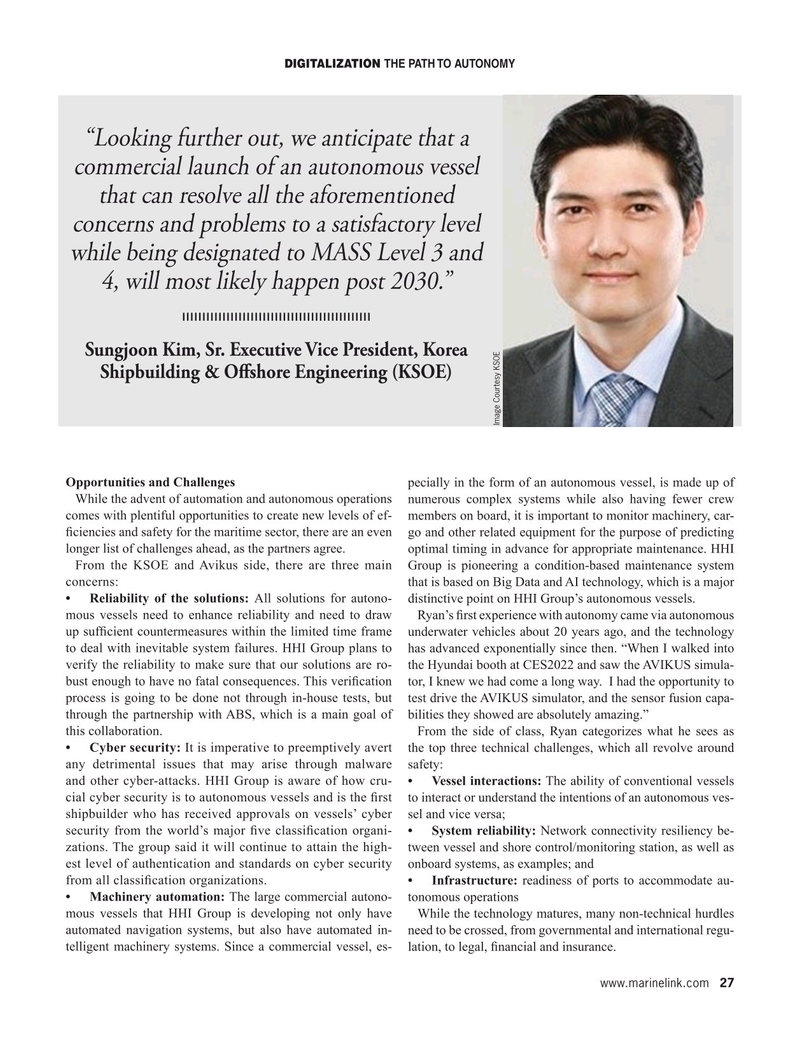
Page 27: of Maritime Reporter Magazine (April 2022)
Offshore Energy
Read this page in Pdf, Flash or Html5 edition of April 2022 Maritime Reporter Magazine
DIGITALIZATION THE PATH TO AUTONOMY “Looking further out, we anticipate that a commercial launch of an autonomous vessel that can resolve all the aforementioned concerns and problems to a satisfactory level while being designated to MASS Level 3 and 4, will most likely happen post 2030.”
Sungjoon Kim, Sr. Executive Vice President, Korea
Shipbuilding & Of shore Engineering (KSOE)
Image Courtesy KSOE
Opportunities and Challenges pecially in the form of an autonomous vessel, is made up of
While the advent of automation and autonomous operations numerous complex systems while also having fewer crew comes with plentiful opportunities to create new levels of ef- members on board, it is important to monitor machinery, car- ? ciencies and safety for the maritime sector, there are an even go and other related equipment for the purpose of predicting longer list of challenges ahead, as the partners agree. optimal timing in advance for appropriate maintenance. HHI
From the KSOE and Avikus side, there are three main Group is pioneering a condition-based maintenance system concerns: that is based on Big Data and AI technology, which is a major • Reliability of the solutions: All solutions for autono- distinctive point on HHI Group’s autonomous vessels.
mous vessels need to enhance reliability and need to draw Ryan’s ? rst experience with autonomy came via autonomous up suf? cient countermeasures within the limited time frame underwater vehicles about 20 years ago, and the technology to deal with inevitable system failures. HHI Group plans to has advanced exponentially since then. “When I walked into verify the reliability to make sure that our solutions are ro- the Hyundai booth at CES2022 and saw the AVIKUS simula- bust enough to have no fatal consequences. This veri? cation tor, I knew we had come a long way. I had the opportunity to process is going to be done not through in-house tests, but test drive the AVIKUS simulator, and the sensor fusion capa- through the partnership with ABS, which is a main goal of bilities they showed are absolutely amazing.” this collaboration. From the side of class, Ryan categorizes what he sees as • Cyber security: It is imperative to preemptively avert the top three technical challenges, which all revolve around any detrimental issues that may arise through malware safety: and other cyber-attacks. HHI Group is aware of how cru- • Vessel interactions: The ability of conventional vessels cial cyber security is to autonomous vessels and is the ? rst to interact or understand the intentions of an autonomous ves- shipbuilder who has received approvals on vessels’ cyber sel and vice versa; security from the world’s major ? ve classi? cation organi- • System reliability: Network connectivity resiliency be- zations. The group said it will continue to attain the high- tween vessel and shore control/monitoring station, as well as est level of authentication and standards on cyber security onboard systems, as examples; and from all classi? cation organizations. • Infrastructure: readiness of ports to accommodate au- • Machinery automation: The large commercial autono- tonomous operations mous vessels that HHI Group is developing not only have While the technology matures, many non-technical hurdles automated navigation systems, but also have automated in- need to be crossed, from governmental and international regu- telligent machinery systems. Since a commercial vessel, es- lation, to legal, ? nancial and insurance.
www.marinelink.com 27
MR #4 (18-33).indd 27 4/5/2022 10:42:24 AM

 26
26

 28
28
